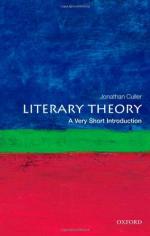|
This section contains 453 words (approx. 2 pages at 400 words per page) |

|
Literary Theory: A Very Short Introduction Summary & Study Guide Description
Literary Theory: A Very Short Introduction Summary & Study Guide includes comprehensive information and analysis to help you understand the book. This study guide contains the following sections:
This detailed literature summary also contains Topics for Discussion and a Free Quiz on Literary Theory: A Very Short Introduction by Jonathan Culler.
Literary Theory, A Very Short Introduction by Professor Jonathan Culler, takes the approach in describing the subject of literary theory that it is more beneficial to discuss the overall impact of the discipline rather than enter the debate arena and address the questions and controversy that linger about it. An element of controversy exists about literary theory due to its uncertain intersection with literary criticism as well as an even more troublesome issue in that literary theory is accused by some of transforming the study of culture over the past twenty years. Further, it is blamed for sparking disrespect for tradition and what some consider "truth" or conventional wisdom and creating suspicion about the political and psychological elements of society rather than focusing solely on literature.
It is thought by some that literary criticism and literary theory are closely related, while true advocates of the theory see vast distinctions. Surpassing the bounds of critical examination, literary theory delves into esoteric areas of literary works that are complicated and that reach far beyond the parameters of a particular literary work.
Literary theory has revealed much about literature and culture over the years. The roots of today's "modern individual" can be traced squarely back to 18th century writers who described what the behavior of the ideal woman was. Later, these idealistic expectations of women were transferred to men as well. A French writer of the 18th century, Jacques Rousseau, is attributed with developing the concept of the individual self.
In addition to the more sweeping effects that literary theory has discovered and revealed, Culler lays out the technical aspects of the work in which the theorist engages. The analysis of the language used and the meanings it implies as well as overall interpretations are all part of the theorist's job. Thorough explanations are provided on the use and importance of rhetoric, poetics and poetry. The power of the narrative and performative language is also given special focus.
Culler emphasizes the important role of the reader in literary theory. The skills and experience that the reader brings to his/her role is an essential part of the overall competence of literary theory. While a reader does not have to agree with a plot, it is essential that the plot is understandable and engaging at some level in order to contribute to the worth of the work. When the reader is able to identify with a character or circumstances, s/he will want to see the story to its conclusion.
Culler speaks with great respect about literary theory being an endless process; however, he ends on the high note that the thought process that literary theory stimulates is boundless and infinite as well.
Read more from the Study Guide
|
This section contains 453 words (approx. 2 pages at 400 words per page) |

|



